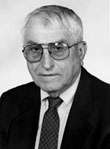John W. Harbaugh
John Warvelle Harbaugh was an American geologist who spent most of his professional career at Stanford University devoted to research on mathematical modeling of dynamic systems, sedimentary basin simulation and oil exploration risk analysis. Since 1999, he is Professor Emeritus both at the Geological and Environmental Sciences Department and at the Energy Resources Engineering Department.[2]
He received numerous honors and awards for his accomplishments and service to the profession that include the Haworth Distinguished Alumni Award of University of Kansas (1968), the A.I. Levorsen Award (1970) from the Pacific Section of the American Association of Petroleum Geologists (AAPG), the Distinguished Service Award also from AAPG (1987), the William Christian Krumbein Medal from International Association for Mathematical Geosciences (1986),[3] and the Distinguished Alumni Award from the University of Wisconsin–Madison (2003). In 2001, his colleagues and friends presented him with a festschrift.[4] In 2013, the International Association for Mathematical Geosciences elected him as Honorary Member.[5]
John W. Harbaugh | |
|---|---|
 Professor John W. Harbaugh | |
| Born | John Warvelle Harbaugh August 6, 1926 Madison, Wisconsin, U.S. |
| Died | July 28, 2019 (aged 92) |
| Citizenship | USA |
| Alma mater | University of Wisconsin–Madison University of Kansas |
| Scientific career | |
| Fields | Stochastic processes Modeling in geology |
| Institutions | Stanford University |
| Website | earth |
Education
- Ph.D. in Geology, University of Wisconsin–Madison
- M.S. in Geology, University of Kansas
- B.S. in Geology, University of Kansas
Books
- John W. Harbaugh, John C. Davis, Johannes Wendebourg (1995). Computing Risk for Oil Prospects: Principles and Programs. Pergamon, 452 p.[6]
- John W. Harbaugh, John C. Davis, John Doveton (1977). Probability Methods in Oil Exploration. John Wiley & Sons, 284 p.[7]
- John W. Harbaugh (1975).Northern California Field Guide. Kendall/Hunt Publishing Co., 123 p.[8]
- John W. Harbaugh and Graeme Bonham-Carter (1970). Computer Simulation in Geology. John Wiley & Sons, 575 p.[9]
- John W. Harbaugh and Daniel F. Merriam (1968). Computer Applications in Stratigraphic Analysis. John Wiley & Sons, 282 p.[10]
References
- Kubota, Taylor. "Geomathematician John W. Harbaugh dies at 92 | Stanford News". News.stanford.edu. Retrieved October 29, 2019.
- "People | Stanford School of Earth, Energy & Environmental Sciences". Earth.stanford.edu. Retrieved October 29, 2019.
- http://iamg.org/images/File/documents/bios/Krumbein%20recipients%20pdfs/1985Harbaugh.pdf
- "Geologic Modeling and Simulation - Sedimentary Systems | Daniel F. Merriam". Springer. Retrieved October 29, 2019.
- http://iamg.org/images/File/documents/Newsletters/NewslettersHSP/NL87med.pdf
- Elsevier (November 22, 1995). "Computing Risk for Oil Prospects: Principles and Programs, Volume 14 - 1st Edition". Elsevier.com. Retrieved October 29, 2019.
- Your name here. "Probability methods in oil exploration: John Warvelle Harbaugh: 9780471351290: Amazon.com: Books". Amazon.com. Retrieved October 29, 2019.
- Your name here. "Northern California, field guide (K/H geology field guide series): John Warvelle Harbaugh: 9780840312730: Amazon.com: Books". Amazon.com. Retrieved October 29, 2019.
- Your name here. "Computer Simulation in Geology: J. W. Harbaugh, G. Bonham-Carter: 9780471351368: Amazon.com: Books". Amazon.com. Retrieved October 29, 2019.
- Your name here. "Computer Application in Stratigraphic Analysis: J W Merriam, D F Harbaugh: Amazon.com: Books". Amazon.com. Retrieved October 29, 2019.